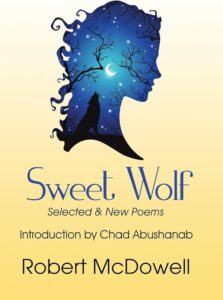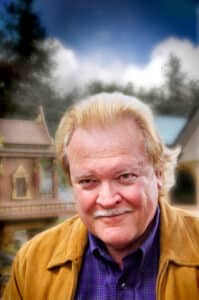Robert McDowell excels in narrative poetry
Like most people, I love a good story. But I’m a sucker for good stories written in poetry. One of my favorite works to reread is Robin Robertson’s The Long Take, an entire noir novel written in poetic form.
I hadn’t previously read poetry by Robert McDowell, so I closely read poet Chad Abushanab’s introduction to McDowell’s Sweet Wolf: Selected and New Poems. Two phrases leaped off the page at me – “lyrical poetry” and, even better, “narrative poetry.”
And I thought, “A storyteller!”
I was not to be disappointed. Not at all.
McDowell tells good stories, and he tells them well. Sweet Wolf pulls from six previous collections and includes an impressive number of new poems. Not all of the poems are narratives, but a sense of narrative pervades them all.
The stories McDowell tells are in turn shocking, surprising, moving, inspiring, thoughtful, and often unexpected. Like the one about the couple who meet over bowling, go on a bowling honeymoon, and whose marriage ends in divorce when the husband’s bowling average falls below 185.
And there’s the bootlegging story; the story of a love triangle with an unexpected ending; the story of the Japanese immigrant to the United States in the late 1930s who finds himself and his family interned during World War II; the story of what happens when a dam collapses, told from the perspectives of the survivors; and the story of the homeless man staring into the window of a Nordstrom’s store and what he sees in his reflection. McDowell tells stories centered on movies like Sideways and Paterson, and how a man becomes a performing clown.
If I have a favorite in the entire collection, it would be “Red Foxes,” the narrative of a family farm foreclosure and auction. The 12-page poem doesn’t immediately explain this is what’s happening, only gradually working into the action of the auction itself and how the family moves on. It’s so well written that I was moved nearly to tears by the ending.
This is how the poem begins.
Red Foxes (excerpt)

Her boat made of nothing but her own skin.
Deep in the comforter she curled like a baby
Waiting for sleep to return. Under the down
She willed herself a dream, but nothing came.
Nothing but cold and the prickly, pre-dawn stillness.
As fast as a ghost she stepped out of her sleeper,
Pulled on her woolen shirt and knee-high socks,
Her jeans and Red Wing boots. The glowing clock
Read 3 as Nessa hustled to the window
Above the field of young rye grass. The crop
Lay under the fog, straining toward warmer weather,
But winter always stayed too long. She tiptoed
Past her parents’ room and down the stairs.
Nessa wondered how they could sleep tonight.
Bundled up in a coat, a hat and gloves,
She headed for the field beyond the barn
And longed for the voice to call her—
“Come into the field
Where all of us are living out our time.”
It’s a beautiful narrative poem, written simply and powerfully. All 12 pages of it.

Robert McDowell
In addition to the six previous poetry collections, McDowell has written several nonfiction works on poetry, including Sound and Form in Poetry, Poetry After Modernism, Poetry as Spiritual Practice, Sonnets: How to Write Them in Minutes, and Haiku: How to Write It in Minutes. He’s also written the novel Emily & Virginia (on Emily Dickinson and Virginia Woolf) and the mystery novel Before I Pray. He’s edited and contributed to numerous collections of essays and poetry. He co-founded The Reaper magazine, Story Line Press, and the annual international Poets Prize, and he founded the Rural Readers Project. His poems have been published by literary and general magazines around the world.
If you enjoy narrative poetry, or simply like reading a good story, Sweet Wolf is a wonder. It’s also a wonderful introduction to an accomplished poet and writer.
Photo by Lukas Schlagenhauf, Creative Commons, via Flickr. Post by Glynn Young.
How to Read a Poem uses images like the mouse, the hive, the switch (from the Billy Collins poem)—to guide readers into new ways of understanding poems. Anthology included.
“I require all our incoming poetry students—in the MFA I direct—to buy and read this book.”
—Jeanetta Calhoun Mish
- Longfellow’s “Paul Revere’s Ride”: Creating a National Legend - April 17, 2025
- Poets and Poems: Katie Kalisz and “Flu Season” - April 15, 2025
- Poets and Poems: Michelle Ortega and “When You Ask Me, Why Paris?” - April 10, 2025


Leave a Reply